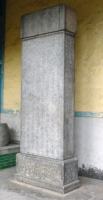Demote Blue shows off Grandnephew name of a river
MOUNTAIN-STONES
On the Festival of the Moon to Sub-official Zhang
Stopping at a Temple on Heng Mountain I Inscribe this Poem in the Gate-tower
A Poem on the Stone Drums
The title of emperor li chun's reign in tang dynasty Holiness Poetry
Qin cao 10 would go to gymnastics
Qin cao 10 Yi-Lan Cao
琴操十首。龟山操
Qin cao 10 Cao Yue-chang
琴操十首。拘幽操
Qin cao 10 Mt. qi (between shanxi and shan3xi) grasp
Qin cao 10 Fulfill cream parade
Qin cao 10 Pheasant flying towards grasp
Qin cao 10 Do hu grasp
Qin cao 10 Residual form of exercise
Nanshan Poetry
(surname) Artlessness poem
Qiu Huai Shi 10 a (poem)
Went to Gangneung En route Wang donated Score Buque (a surname) Eleven Gleaning Ministry councillor Member of the imperial academy three bachelor
Evening Line Embankment ascending
Song of the Night
Heavy cloud Li guan Illness donated
Jiang han answer Meng Jiao
| Multiple poems at a time |
A Poem on the Stone Drums
石鼓歌
Han Yu
Chang handed me this tracing, from the stone drums,
Beseeching me to write a poem on the stone drums.
Du Fu has gone. Li Bai is dead.
What can my poor talent do for the stone drums?
...When the Zhou power waned and China was bubbling,
Emperor Xuan, up in wrath, waved his holy spear:
And opened his Great Audience, receiving all the tributes
Of kings and lords who came to him with a tune of clanging weapons.
They held a hunt in Qiyang and proved their marksmanship:
Fallen birds and animals were strewn three thousand miles.
And the exploit was recorded, to inform new generations....
Cut out of jutting cliffs, these drums made of stone-
On which poets and artisans, all of the first order,
Had indited and chiselled-were set in the deep mountains
To be washed by rain, baked by sun, burned by wildfire,
Eyed by evil spirits; and protected by the gods.
...Where can he have found the tracing on this paper? –
True to the original, not altered by a hair,
The meaning deep, the phrases cryptic, difficult to read.
And the style of the characters neither square nor tadpole.
Time has not yet vanquished the beauty of these letters –
Looking like sharp daggers that pierce live crocodiles,
Like phoenix-mates dancing, like angels hovering down,
Like trees of jade and coral with interlocking branches,
Like golden cord and iron chain tied together tight,
Like incense-tripods flung in the sea, like dragons mounting heaven.
Historians, gathering ancient poems, forgot to gather these,
To make the two Books of Musical Song more colourful and striking;
Confucius journeyed in the west, but not to the Qin Kingdom,
He chose our planet and our stars but missed the sun and moon
I who am fond of antiquity, was born too late
And, thinking of these wonderful things, cannot hold back my tears....
I remember, when I was awarded my highest degree,
During the first year of Yuanho,
How a friend of mine, then at the western camp,
Offered to assist me in removing these old relics.
I bathed and changed, then made my plea to the college president
And urged on him the rareness of these most precious things.
They could be wrapped in rugs, be packed and sent in boxes
And carried on only a few camels: ten stone drums
To grace the Imperial Temple like the Incense-Pot of Gao –
Or their lustre and their value would increase a hundredfold,
If the monarch would present them to the university,
Where students could study them and doubtless decipher them,
And multitudes, attracted to the capital of culture
Prom all corners of the Empire, would be quick to gather.
We could scour the moss, pick out the dirt, restore the original surface,
And lodge them in a fitting and secure place for ever,
Covered by a massive building with wide eaves
Where nothing more might happen to them as it had before.
...But government officials grow fixed in their ways
And never will initiate beyond old precedent;
So herd- boys strike the drums for fire, cows polish horns on them,
With no one to handle them reverentially.
Still ageing and decaying, soon they may be effaced.
Six years I have sighed for them, chanting toward the west....
The familiar script of Wang Xizhi, beautiful though it was,
Could be had, several pages, just for a few white geese,
But now, eight dynasties after the Zhou, and all the wars over,
Why should there be nobody caring for these drums?
The Empire is at peace, the government free.
Poets again are honoured and Confucians and Mencians....
Oh, how may this petition be carried to the throne?
It needs indeed an eloquent flow, like a cataract-
But, alas, my voice has broken, in my song of the stone drums,
To a sound of supplication choked with its own tears.
Translator: Witter Bynner
【Collections】唐诗300首
